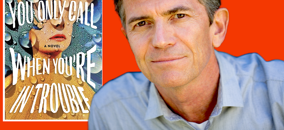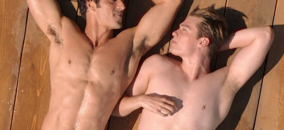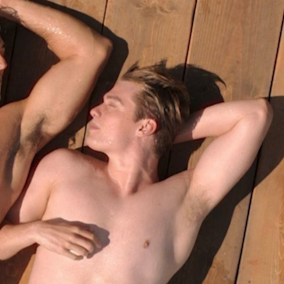
From the kitchen to the ballroom to bookshelves, we’d follow John Whaite anywhere.
The Lancashire-born multi-hyphenate introduced himself to the world on the third series of The Great British Baking Show, where he spoke publicly about being part of the LGBTQ+ community for the first time. Though only 22 and fresh out of securing a law degree, Whaite impressed the judges and audiences alike, winning his season.
His next dance *wink, wink* with reality television came less than a decade later when he competed on the 19th season of Strictly Come Dancing (the U.K. predecessor to Dancing With The Stars) alongside Johannes Radebe, making history as the show’s first-ever male pairing. A total fan favorite, the duo placed second.
Now, Whaite opens up about his childhood, his Baking Show breakthrough, his Strictly success, and everything in between in his vulnerable, honest, life-affirming memoir, Dancing On Eggshells.
The book—which showcases Whaite’s recipes and kitchen tips, connecting each to different parts of his own life story—leaves nothing off the table. Still, we had so much more to ask him, so we invited Whaite to be the latest guest of our rapid-fire Q&A series, Dishin’ It. In our conversation, the chef and author reveals his go-to comfort dish, his dinner party flop, and the cathartic experience of writing Dancing On Eggshells.
Is there a piece of media—whether a movie, TV series, book, album, theater, video game, etc.—that you consider a big part of your own coming-out journey or that has played an important role in your understanding of queerness? Why does it stand out to you?
There wasn’t much when I was really young, apart from, perhaps, Russell T Davies’ Queer As Folk, which I wasn’t allowed to watch as I was too young.
But when at college studying Spanish, I really got into the films of Pedro Almodóvar. They really celebrate the melting pot of humanity and the hodgepodge of genders and sexualities found within it. It made me sort of proud to be one of the outcasts, because even the outcasts are a part of the bigger picture.
Your new memoir, Dancing On Eggshells, is incredibly honest and brave—through the good times and the bad times, your voice and your giant heart always shine through. Was there a section/chapter of the book that felt most cathartic for you to write? Why was it important for you to share that story with the world?
The part in chapter 2 where I talk about sexual encounters as a 13-year-old with a man more than twice my age. I had to have frank conversations with my family about that, about whether I should include it. I decided to do so, not to be sensationalist or to drive chitchat around the book, but because I believe, from my own lived experience and that of others I have spoken to, that youngsters are vulnerable. Those who are at that pivotal age of figuring themselves out can easily be taken advantage of.
I never considered it to be grooming at the time, but I look back on it now with a new-found wisdom and acceptance that the man did indeed groom me; he abused me, and the impact that had on my sense of self has been really quite profound. It meant that for many years, sex wasn’t precious to me. It was almost a commodity that I’d trade for acceptance.
Related*


John Whaite reveals he & fiancé took a break after he fell in love with ‘Strictly Come Dancing’ partner
“So yes, I fell in love with Johannes [Radebere]. I still love Johannes,” says Whaite.
You pair each chapter of your book with different signature recipes. With that in mind, what’s a dish/recipe of yours that you think best speaks to or represents the process of writing the book and why?
Corned Beef Hash. It’s a really basic, cheap meal in the UK that we prepare with convenience foods. It’s a dish that puts substance before style and dispenses with that irksome, all-consuming plight for perfection. It’s what food, and indeed life, should truly be about—love, nourishment, calm. F*ck external expectations, because all they do is reduce us to hungry ghosts, needing fulfillment from the words and approval of others.
We don’t believe we’ve heard anyone ask you yet, but: What can you tell us about the look of the book cover and your (gorgeous) photo included? What do you hope it says about you? And why green? (We love green—but we’re just wondering if there’s any significance to it.)
That’s a lovely, fresh question. Green is a color I adore. I don’t know why because I’m actually colorblind, so to me, many shades of green appear as brown or even red. But I find green to be a color of calm, of equality. It’s one of the key colors of nature, and nature is so important to me (it’s important to all of us—vital, in fact—but many don’t realize that).
Has there ever been a time when you made food in an attempt to impress a (potential) romantic partner, and it failed or went wrong? What can you tell us about it?
Yes. I once invited my partner of 15 years’ friends over for a dinner party. I made a stupid effort to do a seven-course menu with things like venison wellington, soufflé, and beef stew. I even bought a Siamese fighting fish and put him in a vase of water to be a table centerpiece—none of it went down well. I put too much emphasis on impressing people. A takeaway pizza eaten off our laps in front of the TV would have been far more successful.
Where’s one of the first places/spaces you can remember that made you feel a part of a queer community?
Manchester Pride 2019. It was my first real Pride experience with Paul, and we just got so silly and giddy and spent a full weekend drinking with our friends and celebrating our lives. It was beautiful, and for the first time, it made me see the power and importance of a community.
For many years, I kind of felt a little disdain for the gay village in Manchester; I’d been made to believe it was a salacious and sordid place. It can be, but so can the quiet corners of a church. For the most part, it’s a place of togetherness and a communal identity that many queer kids fear they’ll never experience.
You’ve memorably featured on both The Great British Baking Show and Strictly Come Dancing, but which was more stressful to compete in and why?
Strictly. The Baking Show was, of course, stressful, but I enjoyed it, and it was my head on the line. Strictly wasn’t just about me—as the first male couple in the show’s history, I was doing it for the children who may go to bed at night thinking the world would be better off without them in it, for the older queer generation and it’s allies who fought in the streets for the civil liberties some of us now take for granted.
Who is a queer or trans chef/artist/performer/creator that you think is doing really cool work right now? Why are they someone we should all be paying attention to?
Well, I have to give a special mention to The Vivienne (from RuPaul’s Drag Race UK). She’s a pal, but I’m so proud to see her go from strength to strength. She also represented the community as the first drag queen on Dancing On Ice. But there are so many amazing queer creators and artists that I’d hate to have to choose just one.






























abfab
His union suit…………..perfection. Get them on skull and bones dot com. F u c k !
Nice cake.